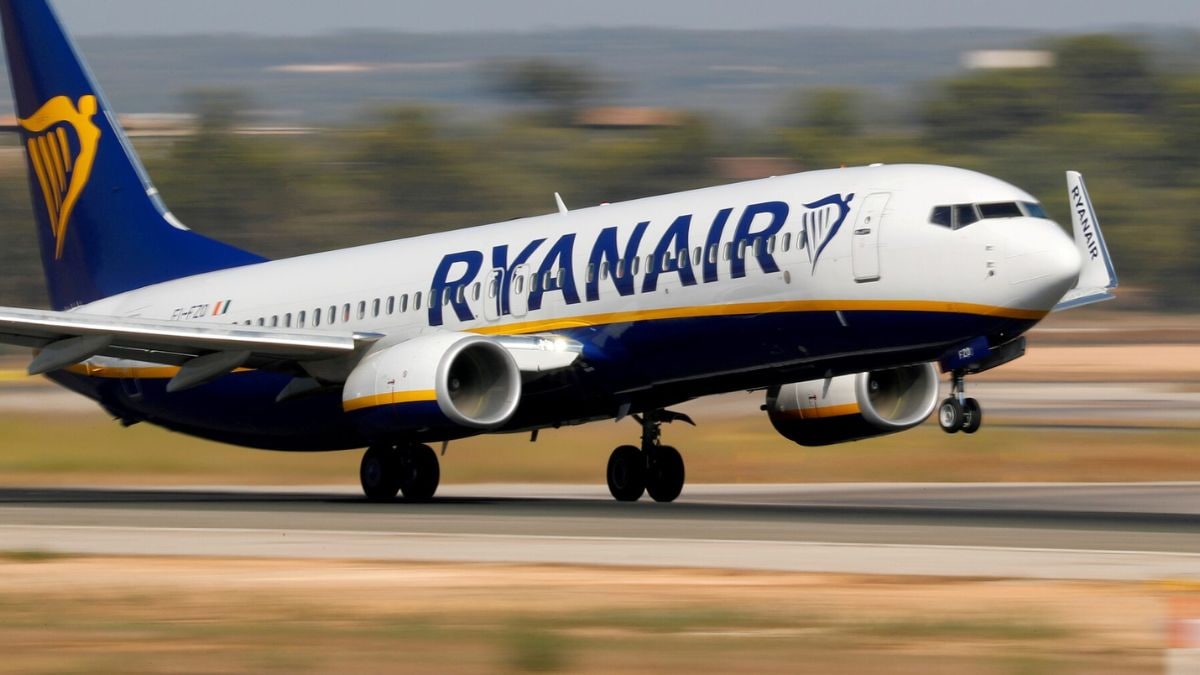Ryanair, Europe’s biggest airline, has called on the European Union to enforce a two-drink limit per passenger at airports. The move by the Irish carrier comes as the problem of drunk travellers onboard flights has seen a jump. Last year, an unruly passenger forced a Ryanair flight to divert to Portugal, leading to significant disruption for over 160 passengers and financial losses to the airline
read more
In a bid to tackle the growing problem of drunk passengers onboard flights, Europe’s largest airline, Ryanair has called for the sale of alcohol to be limited at European airports.
It called on the European Union to enforce a two-drink limit per passenger at airports, imposing it by “using their boarding pass(es) in exactly the same way they limit duty free sales,” an airline spokesperson said in a statement.
What led Ryanair to make this request? Here’s a closer look.
The mid-air mess
The Ireland-based budget airline’s bid stems from a civil lawsuit it recently announced against a former passenger who caused chaos on a flight from Dublin to Lanzarote in Spain last year.
It said that the drunk passenger’s “inexcusable behaviour forced this flight to divert to Porto [Portugal] where it was delayed overnight, causing 160 passengers to face unnecessary disruption” and also forced the airline to bear substantial costs.
In response, Ryanair sued the unidentified passenger for €15,000 (₹13.36 lakh) in damages.
The airline pointed out that while airlines already limit alcohol sales onboard, passengers are still able to consume excessive amounts of alcohol at airports before boarding, especially during delays, without facing similar restrictions.
“We fail to understand why passengers at airports are not limited to two alcoholic drinks, as this would result in safer and better passenger behaviour on board aircraft and a safer travel experience for passengers and crews all over Europe,” Ryanair said in its statement on Monday.
What is the financial cost of diverting a plane?
Ryanair has revealed the significant financial costs incurred after a disruptive passenger caused a flight to be diverted.
Over 160 passengers and six crew members were forced to stay overnight at Porto airport, delaying their onward journey to Lanzarote the following day.
Additionally, Ryanair had to provide an extra aircraft and crew to operate the delayed return flight from Lanzarote to Dublin.
In its legal case against the passenger, which is currently being heard in Irish courts, the airline is seeking €7,000 (Rs 6.23 lakh) for hotel expenses for the passengers and crew, €2,500 (Rs 2.22 lakh) for landing and handling fees at the Portuguese airport, and €1,800 (Rs 1.6 lakh) to cover the cost of replacing the crew due to restrictions on flying hours.
Ryanair is also demanding €800 (₹71,800) for excess fuel costs, €750 (Rs 66,731) in lost inflight sales, and €2,500 (Rs 2.22 lakh) for Portuguese legal fees.
The airline stated, “None of these costs could have been incurred if this disruptive passenger had not forced a diversion to Porto.”
The rising cases of unruly passengers
While still uncommon, incidents involving unruly passengers on planes have been steadily increasing in recent years.
The European Union Aviation Safety Agency has noted that, although it couldn’t provide specific data, “both the number and severity of incidents” have risen in Europe since 2020.
In the United States, the Federal Aviation Administration (FAA) reported 2,102 incidents of unruly passengers in 2023, leading to $7.5 million (€7.3 million) in fines. Though this was a 1% rise from the previous year, it is still significantly lower than the 2021 peak of 5,973 incidents.
The rise in unruly behaviour incidents is also being observed in India, with the most frequent cases of non-compliance, verbal abuse, and intoxication.
Also read:
Bad Air Days: Pee-gate, mid-air fist fights and other horror stories from airlines in India
Globally, the International Air Transport Association (IATA) found that there was one disruptive incident for every 480 flights in 2023, based on over 24,500 reports from 50 operators worldwide. This marked an increase from one incident per 568 flights in 2022.
Conrad Clifford, the IATA Deputy Director General commented, “No one wants to stop people having a good time when they go on a holiday, but we all have a responsibility to behave with respect for other passengers and the crew.”
He added, “For the sake of the majority, we make no apology for seeking to crack down on the bad behaviour of a tiny number of travellers who can make a flight very uncomfortable for everyone else.”
With input from agencies

